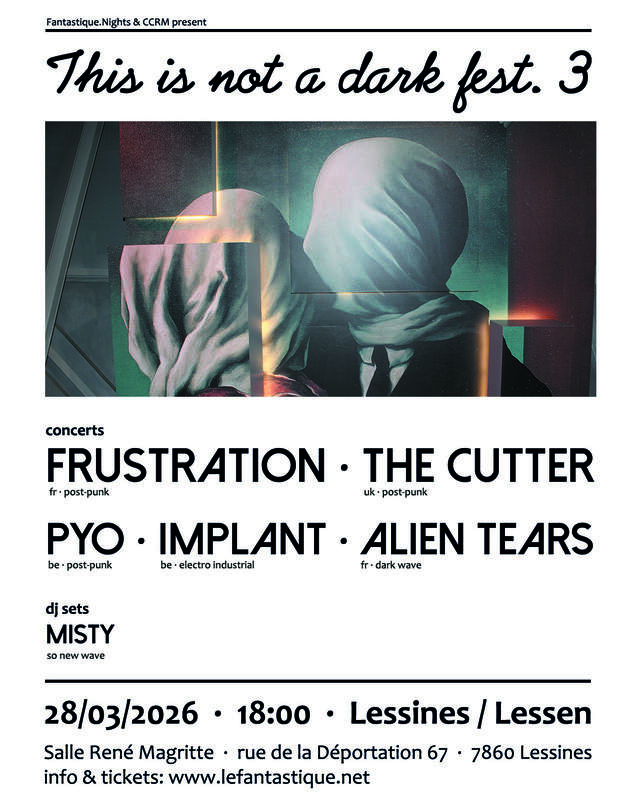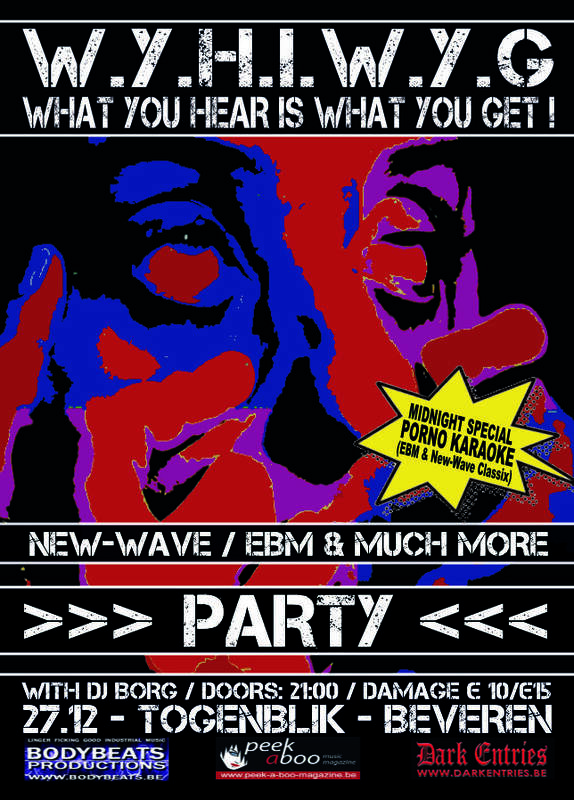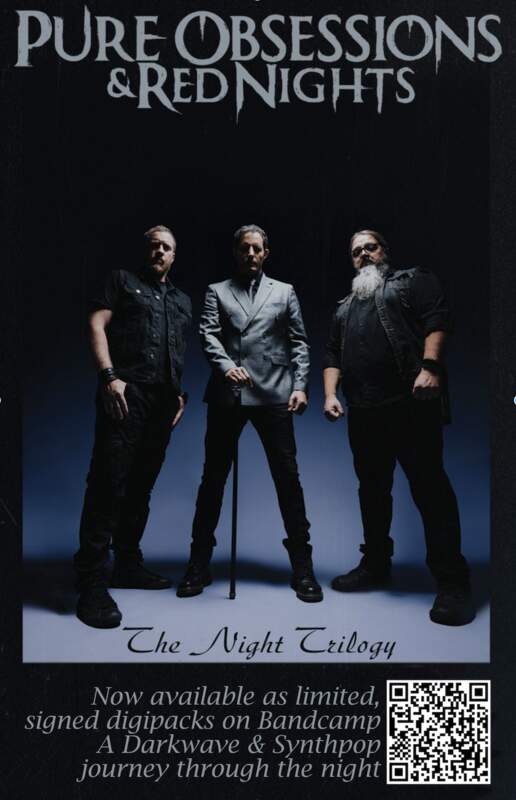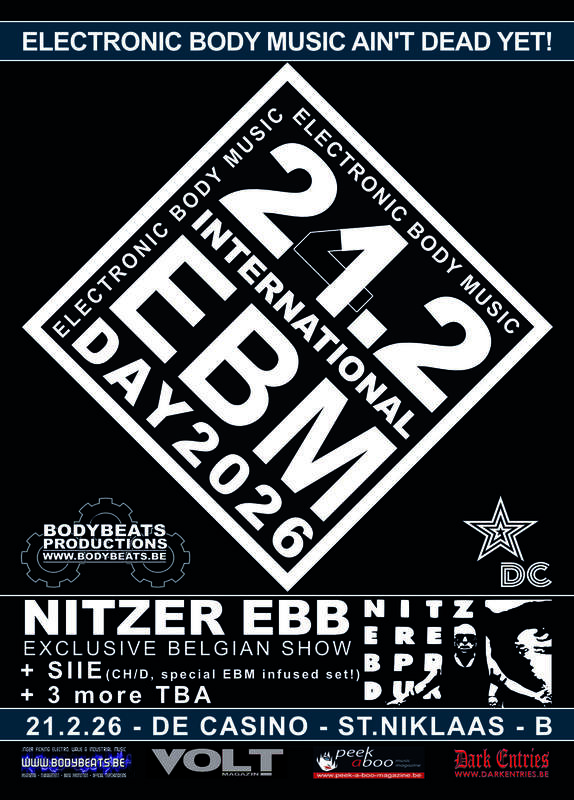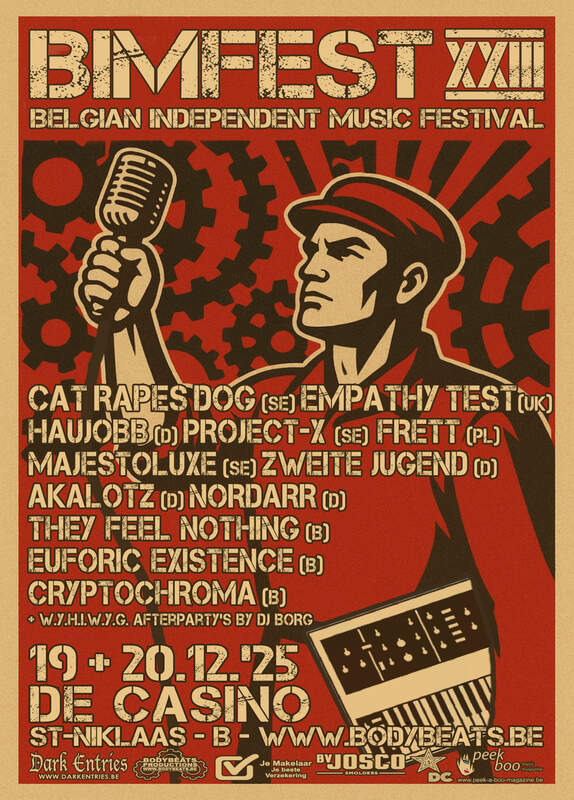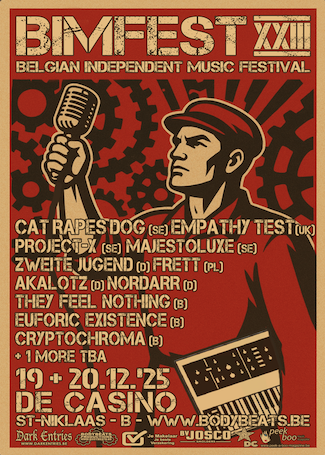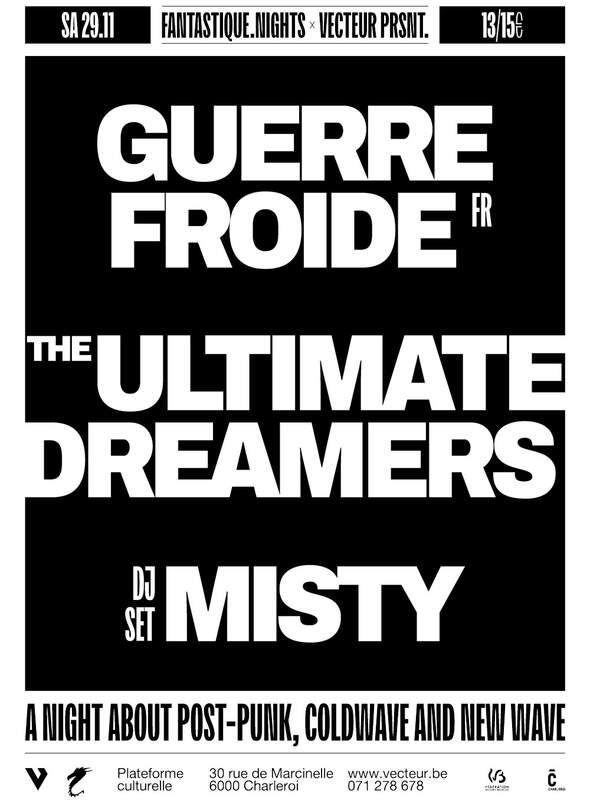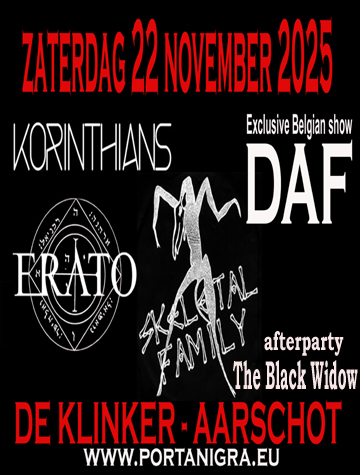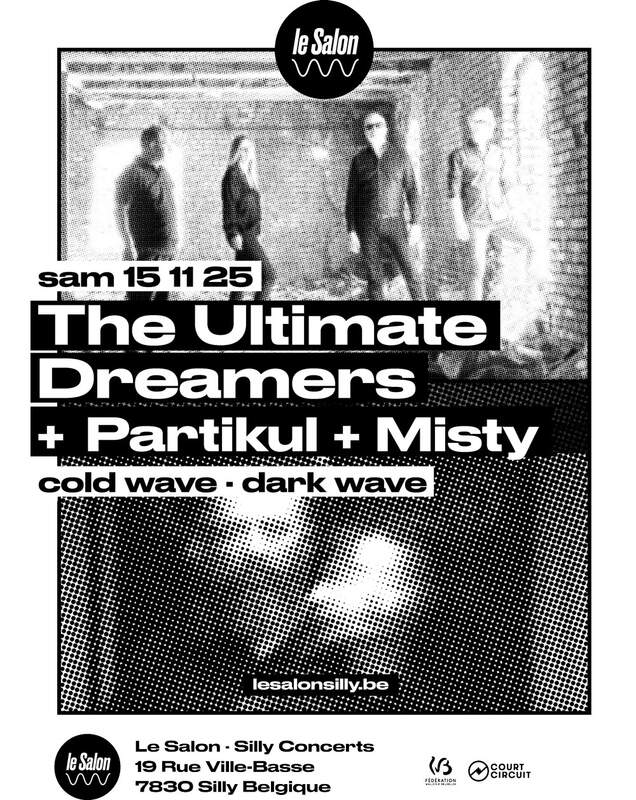By annual tradition, Bimfest takes place at the end of every year, and this year will be no different. On December 19 and 20, in venue De Casino in Sint-Niklaas, the “beats” and “bleeps” will once again come flying at you from all sides. It will arrive sooner than you think so we would like to introduce the participating acts to you one by one.
The London-based electropop duo Empathy Test has been enchanting audiences worldwide since their formation in 2014. The band, led by charismatic singer Isaac Howlett with production and composition handled by Adam Relf, creates a instantly recognizable sound: cinematic synthesizers, driving beats, and sincere vocals that blend nostalgia with a modern twist. Inspired by films such as Blade Runner, Empathy Test reflects a cinematic quality that can be felt throughout their compositions.
Since their debut EP Losing Touch, Empathy Test has released three critically acclaimed studio albums—Losing Touch, Safe From Harm, and Monsters—as well as the live album Time to Be Alive. Fully funded by fans through crowdfunding campaigns, each release underscores the remarkable loyalty of their global fanbase. Empathy Test’s music has been praised by Clash Magazine, MTV, BBC, and KCRW, and is described as “beautiful” and “highly cinematic.”
Live, Empathy Test brings their music to life with an intensity that has earned them headline tours across Europe and the United Kingdom. They have shared festival stages at Wave-Gotik-Treffen and M’era Luna, and have performed alongside iconic acts such as VNV Nation and Aesthetic Perfection.
Now, after more than a decade of making music, Empathy Test embarks on their 2025 European tour, featuring more than 20 shows in 15 cities from September through December. Fans can expect a setlist spanning their entire career, combining early favorites with powerful tracks from Monsters. With their unique blend of emotion and atmosphere, Empathy Test’s 2025 tour promises to be their most ambitious yet—a must-see for fans of synthpop, darkwave, and electronic music worldwide.
Empathy Test, rarely seen live in Belgium, is the headliner on Friday, December 19, and will begin their set at 11:15 PM—but of course, you’ll be there much earlier.
Kurt Ingels (Dark Entries Magazine)

Apoptygma Berzerk Announce “Kathy’s Song XXV” – 25 Year Anniversary Edition
Apoptygma Berzerk are celebrating 25 years of “Kathy’s Song” with a special anniversary edition titled “Kathy’s Song XXV,” due for release on December 22, 2025 via Pitch Black Drive.
Originally released in December 2000, “Kathy’s Song” has grown into one of Stephan Groth’s most enduring and emotionally resonant compositions in the Futurepop genre over the past quater century.
Fans can already pre-add “Kathy’s Song XXV” on Spotify ahead of its official release.
More details to follow shortly.
Below the original version!
By annual tradition, Bimfest takes place at the end of every year, and this year will be no different. On December 19 and 20, in venue De Casino in Sint-Niklaas, the “beats” and “bleeps” will once again come flying at you from all sides. It will arrive sooner than you think so we would like to introduce the participating acts to you one by one.
Zweite Jugend is a two-piece electro/EBM project from Osnabrück, Germany, formed by Eli van Vegas (vocals, sequences, songwriting, production) and Marcel Lüke (drums, songwriting). Their sound is minimalist, analog, raw, yet atmospheric: they often use vintage synthesizers (ARP Odyssey, SH-101, MS20), acoustic drums, voice, and percussion—and little else. Their work evokes elements of late-1970s electronic music and early EBM, but always with modern production and lyrical sensitivity.
Lyrically, the band is reflective, and Zweite Jugend often explores themes such as love, existential longing, human self-destruction, science, and the night. They usually write the lyrics first and then build the music around them. Zweite Jugend released their debut album Liebe ist Luxus in 2016, followed by Elektronische Körpermusik in 2019. Their third full-length album, Der Wille zur Nacht, marks the conclusion of a planned trilogy, further reinforcing their aesthetic of analog purity, dark atmosphere, and emotional introspection.
Zweite Jugend can be seen and heard live on Friday, December 19 at 10:05 PM. Make sure your watch is set correctly—and some people (I won’t name names) will already experience their “Third Youth” with Zweite Jugend at Bimfest!
Kurt Ingels (Dark Entries Magazine)
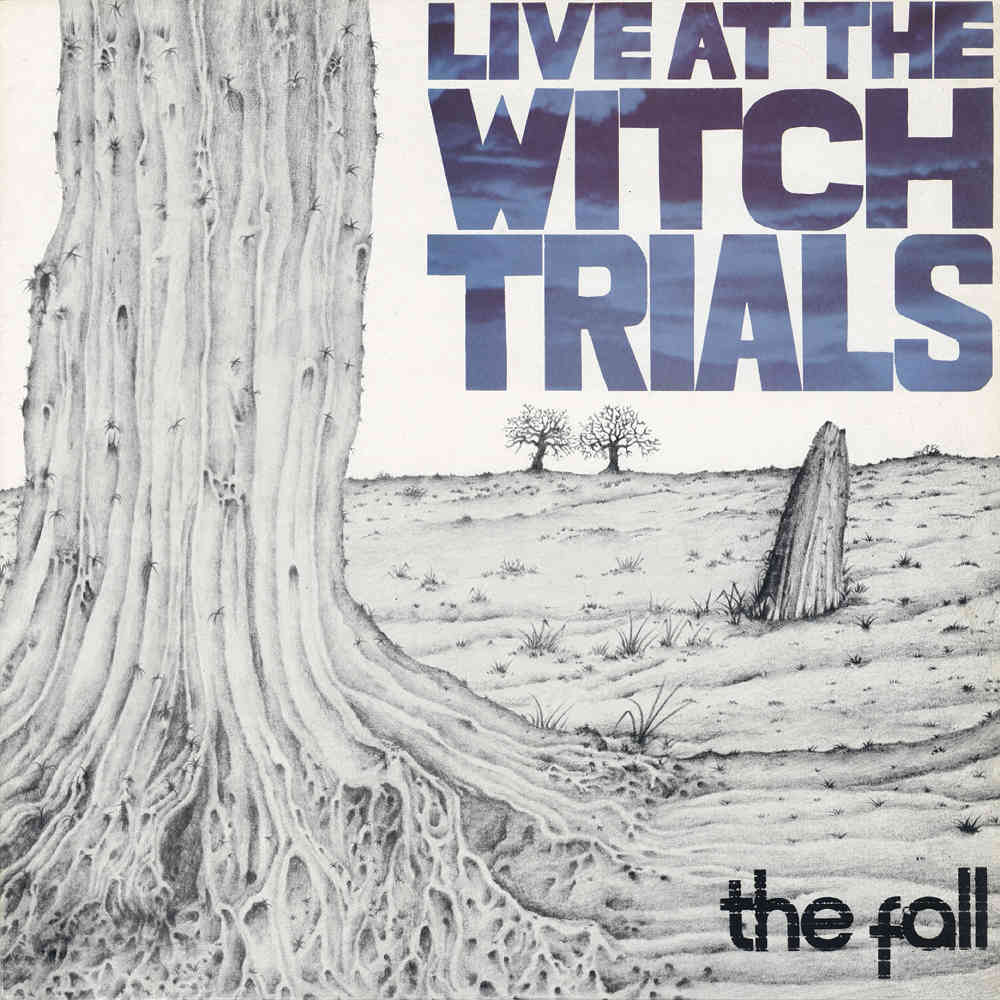
A Date In Camden | On this day 47 ago The Fall recorded Live At The Witch Trials!
This day 47 ago was The Fall entered the Sound Suite In Camden, Greater London and recorded their first long-player:
“Live At The Witch Trials”.
Although recorded in one day on the fifteenth of December and mixed the following day, the album would not hit the shops until mid March 1979.
This however was the very moment the alternative, indie and punk scene exploded under a collision curated by the late Mark E. Smith, the Mancunian rebellious wordsmith, one part Johnny Rotten and one part Ian Dury.
The man who steered this ship of alternative post-punk was as scathing as he was intelligent, not yet the commander and chief but his dominance was already in its infancy and rearing its head.
The fearless nature of the collective unit was the original mark of brilliance which made this a standout release in the late-seventies punk movement, its acts as a time capsule of both the social and economic state of Britain forty-years ago, a narrative of council estates, unemployment;”Rebellious Jukebox”,”No Xmas for John Quays”, “Industrial Estate” and of course the opener, the claustrophobic masterpiece “Frightened”.
Martin Bramah, the original guitarist is solid, melodic and at times the centerpiece, he effortlessly provides a backdrop of intensity, as for Marc Riley and his solid bass which holds the band’s direction together but it is the drumming of Karl Burn which was as wild and ramshackle as they come when it came to providing that extra menacing aspect to the music, this was the classic Fall lineup.
The extra ambiance of keyboards by that unsung hero Yvonne Pawlett was the perfect balance to Smith who, is at the very front on the mix, every word and syllable is clear, unlike later recordings, but here they are friends and comrades which adds to the easy flow of “Live At The Witch Trials”, it was never again this relaxed, this brilliant.
Frightened (Smith/Friel)
Someone's always on my tracks
And in a dark room you'd see more than you think
I'm out of my place, got to get back
I sweated a lot, you could feel the violence
I've got shears pointed straight at my chest
And time moves slow when you count it
I'm better than them, and I think I'm the best
But I'll appear at midnight when the films close
'Cause I'm in a trance
Oh, and I sweat
I don't want to dance
I want to go home
I couldn't live in those people places
Oh, they might get to know my actions
I'd run away from toilets and feces
I'd run away to a non-date on the street
'Cause I'm in a trance
Oh, and I sweat
I don't want to dance
I want to go home
I feel trapped by mutual affection
And I don't know how to use freedom
I spend hours looking sideways
To the time when I was sixteen
'Cause I'm in a trance
Oh, and I sweat
I don't wanna dance
I wanna go home
I'm frightened
Amphetamine frightened
I go to the top of the street
I go to the bottom of the street
I look to the sky, my lips are dry
I'm frightened, frightened, frightened.
Original 1979 Track List;
Frightened
Crap Rap 2 / Like To Blow
Rebellious Jukebox
No Xmas For John Quays
Mother-Sister!
Industrial Estate
Underground Medecin
Two Steps Back
Live At The Witch Trials
Futures And Pasts
Music Scene
[KB]
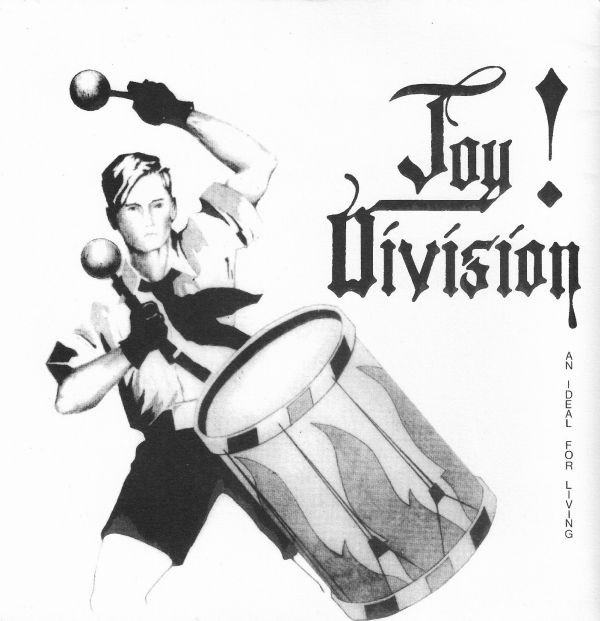
On this day, 48 years ago, Joy Division recorded their very first EP, 'An Ideal for Living'!
On this day, 14th December, it is exactly 48 ago that Joy Division recorded their very first EP An Ideal for Living (14.12.1977). In fact by the time of these recordings the band was still called Warsaw. It was released the year after on 3rd June 1978 by the band's own label, Enigma, shortly after the group changed its name from Warsaw to Joy Division. The EP was recorded at Pennine Studios in Oldham and self-financed by the band on a budget of £400 (+/-€ 450).
The original 7" version of An Ideal for Living (1000 copies) was sold out by September 1978 and was subsequently followed by a 12" version on 10th October on the band's own Anonymous Records label. All four tracks were re-released on the 1988 singles compilation, Substance.
The cover has a black-and-white picture of a Hitler Youth member beating a drum, which was drawn by guitarist Bernard Sumner. The cover design, coupled with the nature of the band's name (Joy Division was the name from the sexual slavery wing of a Nazi concentration camp mentioned in the 1955 novel House of Dolls) fuelled controversy over whether the band had Nazi sympathies. When the EP was re-released on 12-inch vinyl, the original cover was replaced by artwork featuring scaffolding.
The EP has an overall more punk-rock sound than towards the post-punk/new wave sound that their future releases would get. Founding members Hook and Sumner acknowledged forming the band inspired by and after witnessing a Sex Pistols concert.
An Ideal For Living (Track listing)
- "Warsaw" – 2:26
- "No Love Lost" – 3:42
- "Leaders of Men" – 2:34
- "Failures" – 3:44
Today, the original 7" pressing has become an expensive collectors' item and copies have been traded on the internet for over € 2,700!






